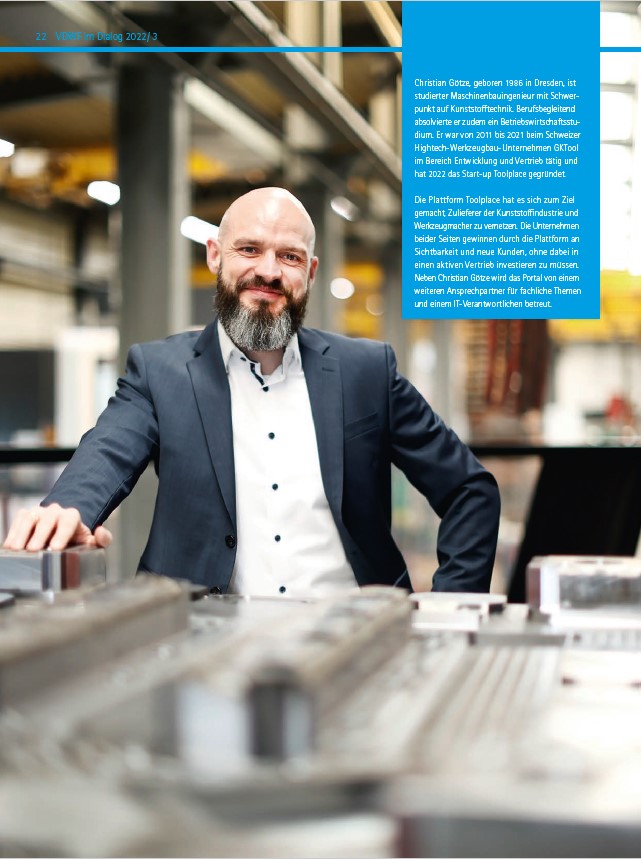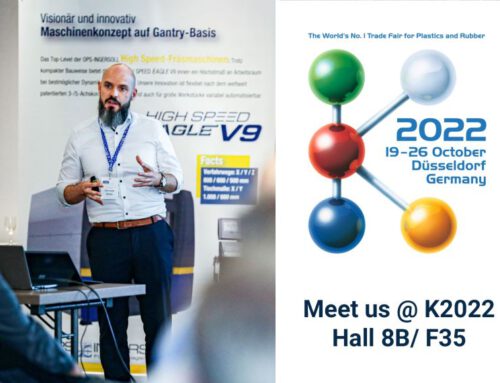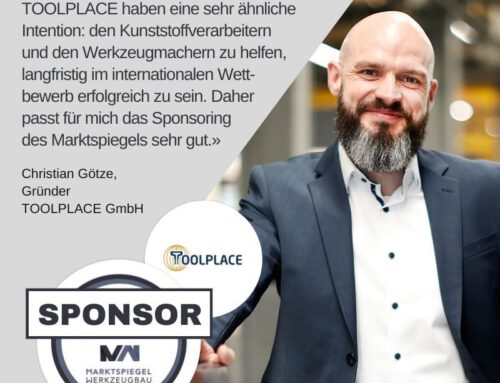Here is the interview that Fabian Diehr from wortundform conducted with our Christian Götze. The interview was printed in the VDWF magazine 03/2022 from page 24. The link can be found below the text.
The partner agency of the plastics industry – In conversation with the founder of the platform Toolplace Christian Götze
Finding partners in the tool and die industry: An active sales department is an effective way to win customers with the right portfolio. Especially for smaller companies, however, the investment in a sales employee is often a not inconsiderable financial burden. In the future, it should also be possible without a sales department: The Toolplace platform helps its members gain more visibility and, conversely, provides the right “matches” for plastics processing companies.
Christian, how did you come up with the idea for Toolplace?
During my time at GKTool, it was always natural for me to approach customers with a proactive sales approach and look for ways to generate added value for them. I then realized that this approach is not a matter of course for many toolmakers in the industry, quite the contrary. The same is true for plastics processors: not every injection molder has the opportunity to employ a strategic buyer. So I thought about how I could use my skills, my experience in mold technology, development and sales, to tie up the many loose ends and move both industries forward.
How long has the idea been around?
Lange. I’ve been thinking about the concept for 3 years. But in addition to the good idea, the step into self-employment is of course also a big decision. Last year in May, my wife gave me a mug with the Toolplace logo for my birthday. That was the final impulse to finally get started.
The toolmaking industry and the plastics processing industry are currently under a lot of pressure, not only from Corona but also from increasing price pressure and supply bottlenecks. What was it like for you to found a startup during this time?
Starting my own business has always been my dream. I’m used to working a lot and since founding Toolplace I’ve been working even more. But it’s just fulfilling. I’ve been in the industry for over 10 years and I’ve developed this passion for high-precision engineered tools. And with my startup here, I can help overcome crises. And as far as the time is concerned – so it’s just right now.
Also because the players have become more digital?
Through Corona, many companies have become accustomed to working digitally, so they have become more open. And the step of digitizing the supplier search is actually only logical. Of course, you still have to discuss the technical details of a project in person.
And how has the online platform been received so far?
We are currently in the development and test phase and are tinkering with the matchmaking algorithm. But we will officially go online at the K in October. In fact, 15 moldmakers are already on it or in the onboarding process. In addition, there are about five sprayers. In any case, the feedback is very positive.
What criteria will be used to decide whether to propose or not?
First of all, there won’t be one algorithm, but different ones depending on the process technologies or the specific needs requested. Toolplace then makes a pre-selection in order to relieve the searchers of work and make the selection easier. I have worked out the criteria myself primarily on the basis of my many years of experience and my good network with toolmakers, plastics processors and machine manufacturers. The focus is clearly on technology. This includes aspects such as process technology know-how, i.e. whether, for example, 2-component injection molding, metal overmolding or film back molding is required. Then there is the size of the component, especially if it is to be very large or very small. Experience with injection molding materials is also an important point. The same applies, of course, to the industry with regard to certain certifications that are required. But regionality can also play a role.
So Toolplace helps to shorten processes and make them more efficient.
Absolutely. For small and medium-sized companies, it’s very practical to get support in the supplier search and pre-selection process. The fact that Toolplace allows the inquiry process to be fully structured and automated on the platform also saves a lot of time for parts manufacturers. Adding new suppliers to the portfolio becomes much easier. And in general, having a larger portfolio makes companies more competitive. Toolplace makes it easier for plastics processors to find suitable suppliers, easier to implement projects, easier to get into OEM budgets. And they can always be sure that a potential partner really can do what he advertises. Finally, Toolplace validates all suppliers before they are approved and proactively suggested on the platform.
How does this validation process work?
There is a checklist for the toolmakers’ competence profile that I developed myself. They have to fill it out during the onboarding process. This is followed by an on-site visit, where I look at the company together with the technical specialists and evaluate the competencies specified.
The bottom line is that Toolplace is a kind of dating platform. And the wedding is even co-organized.
When things have to move fast, I call Toolplace the “elite dating service of the plastics industry. The plastics processor has a concrete need that can be specified technologically. Toolplace, in turn, takes the technological specialties of toolmakers and brings both sides together on the platform. The need is “matched” with the competence, so to speak. And yes, we are involved in the organization right up to the altar, so to speak, even if both partners then have to say “I do” themselves.
Your profession is plastics technology, and at the moment Toolplace is geared precisely to that. Will the platform open up further in the future, for example for punching tools?
That is definitely planned. Soon, manufacturers of stamping tools, die-casting tools, and bending and forming tools will also be using Toolplace. After all, many of those who build injection molds actually combine these areas in the same house, and they should of course be able to offer all their competencies. Geographically, the application will also expand. At the moment, we are limited to the DACH region, but in the long term, it is planned to bring orders from all over the world onto the platform.
Does that mean that Chinese toolmakers will also be able to register? Many are afraid of competition from abroad, especially when it comes to low-cost suppliers.
If companies want to do business with suppliers from abroad, they do so anyway, quite independently of Toolplace. And if a company wants to have its already established partners on the platform to structure projects through the portal, that will be possible. However, the supplier validation process is a central component of Toolplace, and for the time being we can only do that in the DACH region and not in China. So if foreign suppliers are registered on the platform, this does not automatically mean that they will also be proactively suggested by TOOLPLACE. Only technologically validated companies will. Apart from that, I definitely believe that there is a demand for high-quality and precise tools made in Germany or Made in Austria or Swiss Made. Toolplace then helps to make both the demand and the corresponding offers visible.
Then there’s the question that’s probably been on most readers’ minds all along: How much does it all cost?
There is a small onboarding fee for everyone and another small annual fixed fee. Apart from that, Toolplace only earns money when orders are actually generated. That’s a business model that’s fair for all sides. And it was also important for me to put pressure on myself and Toolplace to deliver. Toolplace is not meant to take money out of anyone’s pocket, but to be a platform that people like to use!
Curious about TOOLPLACE? Then feel free to contact us.
And here is the link to the VDWF magazine:


